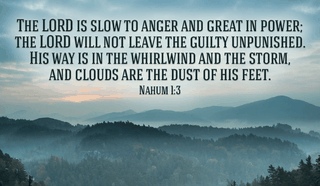
- Recent Translations
- All Translations
Nàhóngshū 1:4
Share
Settings
Images for Nàhóngshū 1:4

Nàhóngshū 1:4 Meaning and Commentary
He rebuketh the sea, and maketh it dry
As he did the Red sea, when the children of Israel passed through it as on dry land; which shows his power and sovereignty over it; that it is at his command, as a servant at his master's; and since the wind and sea obey him, what is it he cannot do? see ( Isaiah 50:2 ) ( 51:10 ) ; and drieth up all the rivers;
that is, he can do it if he will; he divided the waters of Jordan, through the midst of which the Israelites passed on dry ground; and will dry up the river Euphrates, to make way for the kings of the east; and as for Tigris, on the banks of which the city of Nineveh stood, of which the inhabitants boasted, and in which they trusted for their security, he could dry up, and make way for the enemy to enter in; or make that their enemy, and overflow them with it, as he did; see ( Nahum 1:8 ) ( 2:8 ) . By the "sea" and "rivers" may be meant the whole Assyrian empire, and many nations and people, as Jarchi and Abarbinel interpret it, of whom it consisted; see ( Jeremiah 51:36 ) ( Revelation 17:15 ) ; Bashan languisheth, and Carmel, and the flower of Lebanon languisheth;
when the Lord restrains the heavens from giving rain, then Bashan, famous for its fat pastures and fruitful meadows, and Carmel for its rich grain fields, and Lebanon for its tall shadowy cedars, these, and the glory of all, wither and fade away, being parched and dried up for want of moisture. These were places in the land of Israel, but may be put for like flourishing and fruitful hills and countries in the land of Assyria, which should become desolate; see ( Psalms 107:33 Psalms 107:34 ) .
